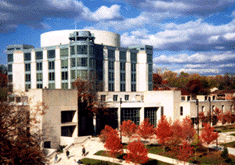Extra-Departmental
resources
|
| Research in the Department
of Biological Sciences is enhanced by the very active research programs
in allied departments. Students in our programs often take advantage
of resources in those departments to pursue their research, both
the human resources of faculty willing to participate on advisory
committees and physical resources of the vast amount of specialized
equipment available in those departments. |
|
The Department of Chemistry
and Biochemistry have extensive facilities available for cutting-edge
research. The specialized research instrumentation available includes:
- calorimetry
- chromatography
- stopped-flow and
temperature-jump kinetics
- nanosecond laser
flash photolysis and nuclear magnetic resonance spectroscopy
(including an 800-MHz instrument)
|
|
- various types of spectrometry
(electron spin resonance, circular dichroism, X-ray diffraction,
infrared, laser fluorescence, atomic absorption spectroscopy)
- gas chromatography-mass
spectrometry
- Fourier transform/ion
cyclotron resonance mass spectrometry
- extensive molecular
modeling computer facilities
|
|
Also located in the department
is a Center for Structural Biochemistry, which specializes in the
structural analysis of biological molecules (e.g biopolymers, peptides,
glycoproteins). In addition to a laser desorption mass spectrometer
and two 500-MHz and 600-MHz NMR’s the center houses one of the few
tandem mass spectrometers located in academic institutions worldwide.
|
| The Howard Hughes Medical
Investigator Suite houses the second 600- and the 800-MHz NMRs, used
for high-dimensional studies of HIV proteins, metallobiomolecules,
and macromolecular interactions. |
|
| The Albin
O. Kuhn Library provides computerized access to national databases
and to other libraries in the University System of Maryland, in addition
to its own extensive collection of scientific books and journals.
The Library also houses the Archives for the American Society for
Microbiology, Society for Developmental Biology, Tissue Culture Association,
American Society for Cell Biology, International Union of Immunological
Societies, Society of Protozoologists, American Type Culture Collection
and the American Association of Immunologists. |
 |
|


